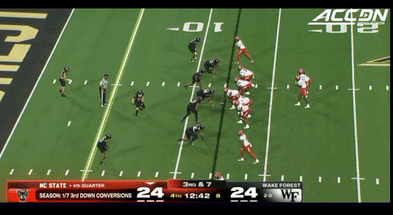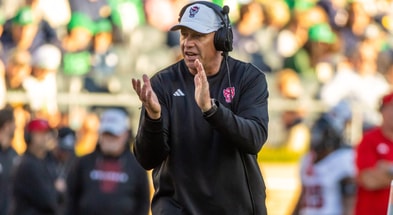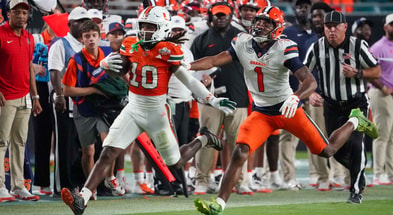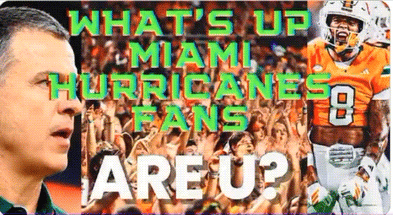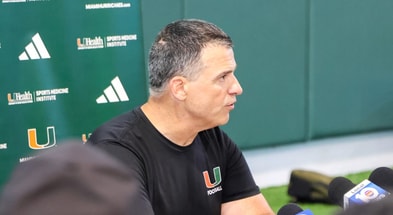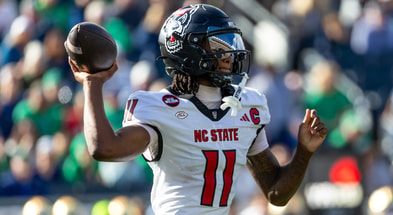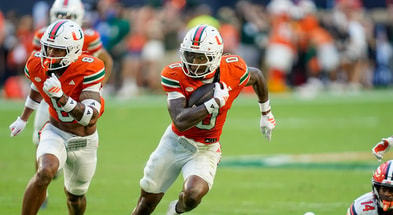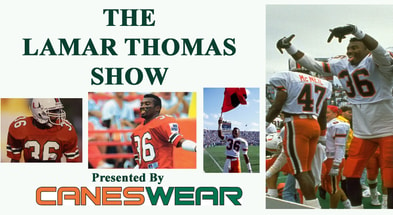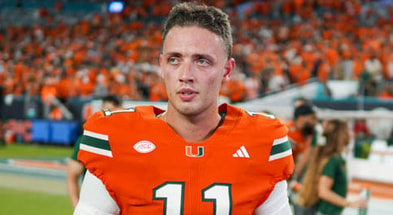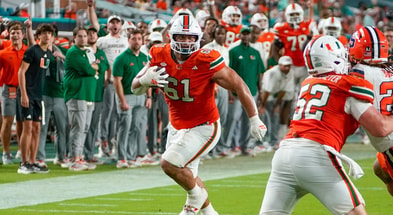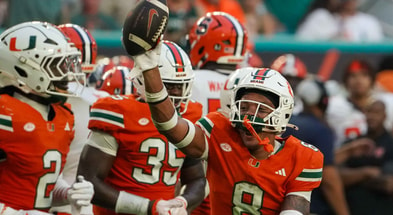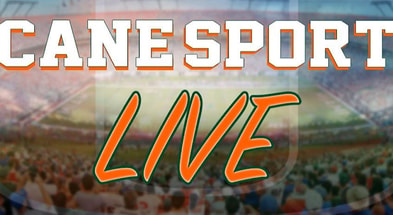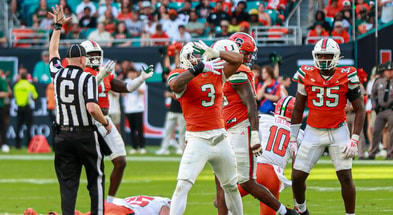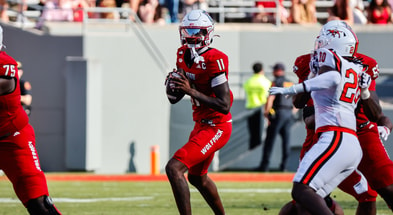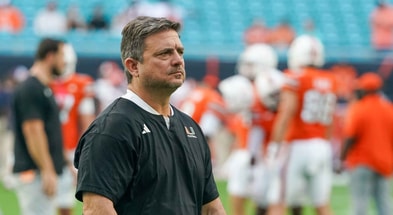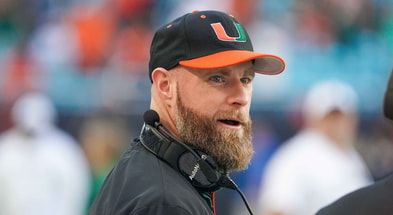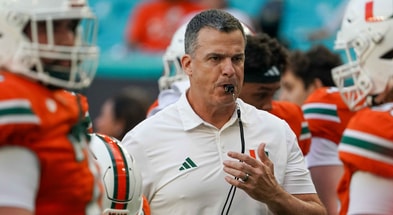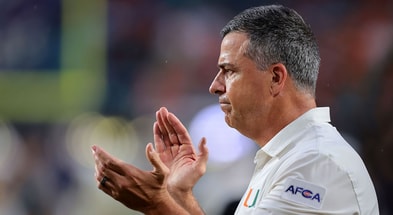OPINION: The President who runs through the smoke is changing the game for The Miami Hurricanes
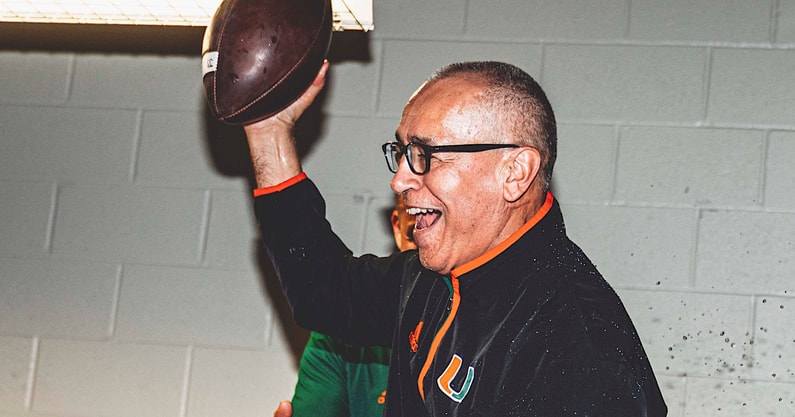
The man with the biggest smile as the University of Miami football team runs through the thick smoke at Hard Rock Stadium for the final time this season on Saturday won’t be a graduating senior like Carson Beck. You will see him all the way in the back, behind the players. He will be walking, not running.
“Running is okay if you’re young and spry,” Joe Echevarria says.
Echevarria is 69, in his retirement job as President of the University of Miami. More on that later. But throughout its storied 100-year history, The U has never had a greater friend of the athletic department and football program in that big office in the middle of campus.
“So I’m walking through. I just walk. I’m the last person to come through that tunnel, and I still can’t see with the smoke,” Echevarria said this week during an appearance on CaneSport’s The Lamar Thomas Show. “I start thinking `If I start running, I’m not going to get through this.’ I walk out of the smoke. It’s glorious, man, it really is glorious.”
Hopefully you can feel the excitement in his words. It is genuine. Miami didn’t put an academician in the President’s office when it replaced Julio Frenk a year ago. It hand-picked a fan of its athletic program and it was not by accident.
Echevarria, a 1978 alumnus of the University, had helped make Miami financially secure by finding a path to max out the profits of the U Health enterprise that was the vision of one of his predecessors, Donna Shalala. Now he was needed to help oversee the reinvestment of some of those dollars toward the revival of the struggling U athletic brand on a worldwide level.
ESPN College Football analyst Kirk Herbstreit gets a lot of the credit for embarrassing the University on national television one morning on College GameDay as the 2021 football season ended in disappointment. Herbstreit questioned the university administration’s commitment to football and called out the school for not having the president (Julio Frenk), athletic director (Blake James) and head coach (Manny Diaz) aligned in their goals and visions for the football program.
“Go all the way back to 2006,’’ Herbstreit said. “It was the last year that Larry Coker was the coach there. That’s 15 years. Miami has averaged 7-5 since 2006. They’ve had five head coaches. Just think about with the Orange Bowl gone, the student body has to drive 45 minutes to go to their games. You have an athletic department that clearly is not really showing that this is something that they are willing to try to make changes.
“To me, college football — you look at the powerhouse programs: Alabama, Clemson, Ohio State, president, AD, head coach, same vision. They’re aligned in their vision for what needs to happen. Recruiting, budget, staff, whatever a team needs. That’s what it takes. Miami doesn’t have that. So I don’t think it matters who the head coach is. Until you get a president and an AD and a coach together on the same page, I guess football doesn’t matter. It matters to the alums, to the brotherhood of the U. But I don’t know if it matters to the people making the decisions at Miami. And if they don’t change that, it doesn’t matter who’s the head coach.”
It has changed and then some.
Maybe it’s not totally whatever it takes, but if it isn’t, it is very close to that.
It doesn’t take being around Echevarria very long to figure out he is truly all in, and not just with football. He crows about what he calls “his volleyball team” that now is ranked No. 14. He talks about sweating during basketball games. He presided over the hiring of a first-time head coach in Jai Lucas but made sure he had the resources to build a highly-competitive roster that looks like it will be one of the surprises in the ACC this season.
Echevarria is in the locker rooms. He’s on the sidelines, talking to parents, talking to recruits.
“That statement (by Herbstreit) wasn’t true. But the focus on it was true,” Echevarria said. “We were aligned, but it wasn’t a priority at that level. So my dear friend (President) Julio (Frenk) – remember I was a member of the Board of Trustees. I voted for Julio to be president, sat in the room, raised my hand and got my bagel and cream cheese, went back to work. Julio asked me, because he knew I loved sports, to help (administrator Rudy Fernandez) with athletics even though I was at the health system at the time.
“I said `okay, but then we’re going to have to spend money. Because it’s a new day. You have to invest. Like any business, you invest, but I expect a return. I always tell my people, `I’m going to fund you, but what am I going to get?’ I expect the right culture, the right attitude, do all the right things. And then the on-field performance, I expect improvement every year. Listen, would I love to win a national championship? But only one team is going to win, just one team. I want to first improve, then be relevant, want to be on the national stage, have people talking about us. And we’ve managed to get to that point. Now the final hurdle is still ahead of us.”
Echevarria may not assume that final hurdle will be navigated in the form of a football national title, but he plans to be there if it is. Right there, smack in the middle of every bit of it.
He has a locker in the Hurricane locker room where he changes into his on-field attire for the games, home and away. He runs through the smoke at home games.
There is always a President’s box at every game where people eat and drink and socialize and get pitched for deals with the University. You won’t find Echevarria up there.
“The President’ box gets given to us, it’s Stephen Ross’ box (for Dolphins games). That’s 50 seats and I have wonderful people,” Echevarria said. “What I do now, I bring them down to the field, give them an on-field experience which is really cool. I introduce them (to former players), whether it’s Lamar (Thomas), Ray (Lewis) or Mike (Irvin). I got Jimmy (Johnson) coming by the game, Jim Kelly came for the first time. I also had Jeff Bezos in my box.
“All these people want to support the University of Miami. It is a glorious place. It shaped my life. And so this is just fun, man. I spent 40 years at a wonderful accounting firm, it was fantastic. And I retired. I’m just having fun, man. I love what I’m doing right now. If you were to ask me when I was 17 wandering around campus – `I just need a job, give me a job, I just need to pay some bills and I’ll be happy.’ We’re living the dream.”
Echevarria used to be the CEO of Deloitte LLP, a global provider of professional services, from 2011 until his retirement in 2014. During his 36-year tenure with the firm, he served in various leadership roles, including Deputy Managing Partner, Southeast Region, Audit Managing Partner, and U.S. Managing Partner and Chief Operating Officer. His leadership responsibilities extended to approximately 70,000 professionals in nearly 90 U.S. cities and India, as well as the firm’s US-owned consulting businesses in Germany, Mexico, China, and Brazil.
Top 10
- 1Breaking
YouTube TV
Deal agreed with ESPN
- 2New
Bill Belichick
Addresses Giants, NFL interest
- 3Trending
Last Chance U
Former coach shot on campus, dies
- 4
Injury Report
Notes on OU, Bama & more
- 5Hot
Marcus Freeman
Notre Dame HC blocks out noise
Get the Daily On3 Newsletter in your inbox every morning
By clicking "Subscribe to Newsletter", I agree to On3's Privacy Notice, Terms, and use of my personal information described therein.
Following his retirement from Deloitte and seven years of service on the UM Board of Trustees from 2012 to 2019, Echevarria brought his expertise to the University of Miami Health System as a Senior Advisor to former President Julio Frenk, Interim Chief Financial Officer, Chief Administrative Officer, and Interim Chief Executive Officer. He became Chief Executive Officer of UHealth in 2020 and his responsibilities as CEO grew to include the entire University in 2022. On June 12, 2024, the University of Miami Board of Trustees appointed him Acting President of the University. Four months later, the Board named him President.
“Leadership is a team sport, not different than football,” Echevarria said. “When I went to school in the 70s there was no U, we didn’t throw up The U. We won three games I think my first year in college, our coach got fired in the middle of a Houston Arrows hockey game in Houston. And this became something.
“So I’m not confused about where this logo comes from. It comes from the proudest, in particular two programs – baseball and football. But football being the more dominant sport in America today is really what put us on the map in terms of brand and brand recognition. I traveled the world in my whole life – it doesn’t matter if I’m in Hong Kong, Shanghai, Berlin, New York, Seattle. If I’m wearing something that says The U, somebody yells out `The U!’ to me. All of that happened because of the success of a bunch of young men and women in athletics. That’s where it started.”
So athletics has been the focal point of his administration. It doesn’t mean he has forgotten about U Health or the classrooms and dorms on campus, or the educational side of the University.
“I have a passion to be great at everything we’re involved in. We need to be great in academics, have a great health system and we need to be great in athletics,” he said. “If you aren’t going to be great at something, why bother? “Nobody gets up in the morning and says `You know, I just want to be mediocre, just be average.’ And if they do, that’s not the type of people I want around. And what is ultimately greater than winning? Winning at all three of those things I talked about.
“I’m just having fun now. Every day I’m having fun. It doesn’t matter if I’m downtown with the health system with our patients, whether I’m in the law school, medical school. We are a top 50 research school in the United States. That’s what Tad Foote wanted to accomplish. He’s the one who set that in motion a long time ago. We needed to have a world-class health system because you’re in Miami. Donna Shalala brought one and we learned how to run it five years ago and now it’s world-class. We’ve been world class in athletics, we just didn’t invest in athletics. You know, athletics got expensive and we’re a small private school relatively speaking. But once we turned the health system around then we had some capital. I tell people it’s not going to be due to a lack of investment that we don’t win. It’s going to be because we, including me, didn’t make all the right choices. So all of it is exciting, all parts of it. I’m 69 years old, having the time of my life, bro.”
Bro? When have you ever heard a University President use the word “bro?” Not Henry King Stanford. Not Foote. Not Shalala. Not Frenk. But that’s who Echevarria is. He’s our bro. He’s one of us.
And he wants the feeling that everyone gets from winning and that is why, as long as he is in the building, Miami will likely be competitive in every sport in which it fields a team.
“I love athletics, love my University. But we have to invest,” Echevarria said. “Because if we’re not going to invest, we’re not going to be great. You have no chance, not in this environment. And we have to make that commitment.
“You can also be one-hit wonders, right? There are a bunch of programs that elevate and then collapse. I don’t want to be that. I want to be relevant every year and build a culture that gets us where we need to go compete for national championships. When you have people who work with you who do really well, the first thing is you give them more things right? `You’re doing really well, let me get you some more!’ You don’t say `You’re doing really well, let me take things away from you.’ So you give them more.”
You will see players carrying Echevarria around the locker room after victories. You will see Cristobal award him a game ball. If a player gets injured on Saturday, you may see Echevarria carrying his helmet or sitting with him. One player who didn’t know him once thought he was a trainer.
And you will see Echevarria looking for ways to keep doing more.
“Look for the old man looking out in the smoke,” Echevarria said. “In the back. Look for that guy and make sure he makes it through. Go Canes baby.”
